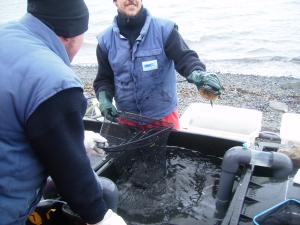Muddy waters and slippery fish: a good day in Jubany
Good days in Jubany are the ones with less wind. Today was a reasonably good day and nearly all groups could go sampling on the boots.
Patrick, Donata and Oscar took sediment cores to measure the profiles of nutrients in the porewater. This gives us important information on sediment metabolic profiles. Yes, sediments "respire". Oxygen is consumed in the sediment surface (only a couple of mm into the sediment column) and below others oxygen containing "nutrients" are the oxidizing agents that fuel bacterial respiration. These nutrients are nitrate, nitrite (NO3 and NO2) which are reduced eventually to ammonium (NH4+), but inbetween also different NO derivatives form which we cannot measure. Bacteria in deeper anoxic sediment horizons (also still in Patricks 60 cm long cores) content with sulfate and produce stinking hydrogen sulfide in the pore water, which smells of wrotten eggs. Before, we all thought that Antarctic surface sediments were full of oxyen (except perhaps for volcanic sites), but here we see that increasing algal growth produces considerable amounts of organic matter which is oxidized/metabolized in the muddy sediments of Potter Cove by bacteria which respire strange things such as sulfate. It is very much what happens on eutrophicated North German Wadden Sea coasts, and it is strange to see how Antarctica coastal sediments are changing.
Below you see Patrick (University of Oldenburg) and Tamara (IAA) taking the porewater samples, while Donata (also University of Oldenburg) is starting the measurements of nutrients in another lab.
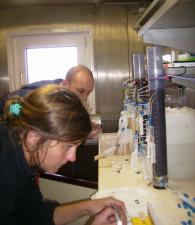 |
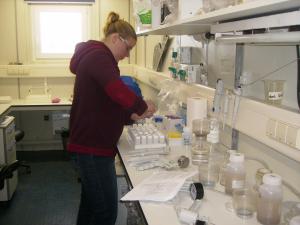 |
Within the same muddy sediments small little and also somewhat bigger animals swim and burrow, rut and glide and Francesca Pasotti (from Ghent University), who also works with muddy sediments cores, sorts the animals out of different sediment depth horizons and puts them into a sieve so they can be seen (by me) sorted and identified (by Francesca).
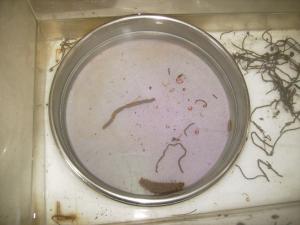 |
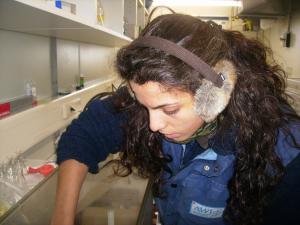 |
And, as for the slippery fish, well here they are, notothenoid fish, freshly trapped in Potter Cove, baited with meat from yesterdays supper leftovers, and now in the hands of Nils Koschnik and Kai Waetjen (both from AWI). I am told that argentine fishes in Potter Cove must be baited with meat, not with fish! Clearly carniverous, these fish are caught for a German research group that will come to Jubany on the icebreaker Polarstern in 2 weeks.
Said that, I am getting hungry and walk over to the Jubany comedor to feed myself some meat for dinner - and no leftovers!
|
|
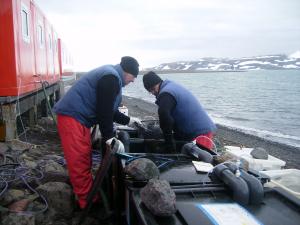 |
Post your comment
Posting comments has been disabled.
Comments
-
Dear tia:
eutrophic means high nutrient levels, more algae, the water becomes less clear and, at the bottom of the sea, less oxygen is available
"notothenoids" is a group/family of Antarctic fish.
Good questions!
besos dorisPosted by doris, 09/03/2011 2:37pm (11 years ago)
-
@ irmhild: thanks for your question. Eutrophical means basically loaded with nutrients, i.e. nutrient enriched waters; Notothenoids are a group of Antarctic fish. They are so well to live in low water temperatures, e.g. they have antifreeze proteins in their blood.
Posted by Valeria, 09/03/2011 10:28am (11 years ago)
-
was ist 1. "euthrophical"
2. "nothothenoid" ??Posted by irmhild, 05/03/2011 5:32pm (11 years ago)
RSS feed for comments on this page | RSS feed for all comments


